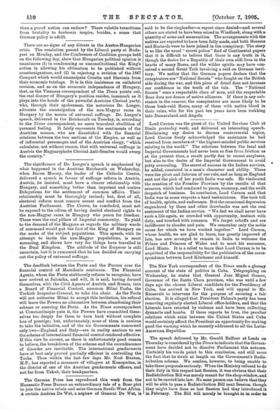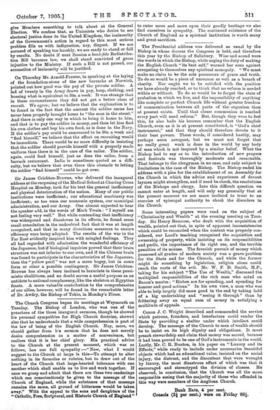said to be the ringleader—a report since denied—and several others
are stated to have been seized in Windhoek, along with a quantity of arms and ammunition. The arrangements with the natives are reported to have been fully made, and both Hereros and Bastards were to have joined in the conspiracy. The story is so like the usual "secret police" find of Continental papers that it is difficult to believe that there is any truth in it, though the desire for a Republic of their own still lives in the heaits of many Boers, and the wilder spirits may have con- ceived a second Great Trek involving a raid on German terri- tory. We notice that the German papers declare that the conspirators are "National Scouts "who fought on the British side during the war, and this piece of detail does not increase our confidence in the truth of the tale. The "National Scouts" were a respectable class of men, and the respectable Boer does not dream of native alliances. If there is any sub- stance in the rumour, the conspirators are more likely to be those bush-veld Boers, many of them with native blood in their veins, who for the past ten years have been trekking, into Damarala,nd and Angola.
Lord Curzon was the guest of the United Services Club at Simla yesterday week, and delivered an interesting speech. Disclaiming any desire to discuss controversial topics, Lord Curzon freely acknowledged the assistance he had received from members of "the highest-minded public services existing in the world." The relations between the local and Imperial Governments had never been so free from friction as at the present time, a result partly due to recent surpluses, but also to the desire of the Imperial Government to avoid petty overruling. The secret of success in the Indian services, he added, consisted in a man's character and ability. These were the pivot and fulcrum of our rule, and as long as England sent out the pick of her youth India was safe. He vindicated the creation of the Frontier Province by the results of that measure, which had conduced to peace, economy, and the swift despatch of business. In conclusion, Lord Curzon said that India was in some respects a hard taskmistress. She took toll of health, spirits, and endurance. But the occasional depression engendered by these and other drawbacks was not the real sentiment of the Indian service. "We feel we shall never have each a life again, so crowded with opportunity, instinct with duty, and touched with romance. We forget rebuffs and are indifferent to slander and pain. We remember only the noble cause for which we have worked together." Lord Curzon, whose health, we are glad to learn, has greatly improved of late, has now arranged to remain in India to welcome the Prince and Princess of Wales and to meet his successor, Lord Mint°. It is a relief to learn that Lord Curzon is to be acquitted of the responsibility for the publication of the corre- spondence between Lord Kitchener and himself.
The New York correspondent of the Times sends a gloomy account of the state of politics in Cuba. Telegraphing on Wednesday, he states that General Jose Miguel Gomez, Governor of the Santa Clara province, who was until a few days ago the chosen Liberal candidate for the Presidency of Cuba, has arrived in New York, and will appeal to Mr. Roosevelt to intervene for the purpose of securing a fair election. It is alleged that President Palma's party has been removing regularly elected Liberal office-holders, and that the Liberals have retorted by violence and have been collecting dynamite and bombs. If these reports be true, the peculiar relations which exist between the United States and Cuba would certainly afford the President an opportunity for making good the warning which he recently addressed to all the Latin- American Republics.
The speech delivered by Mr. Gerald Balfour at Leeds on Thursday is considered by the Times to indicate that the Govern- ment have decided not to dissolve Parliament this autumn. Certainly his words point to this conclusion, and still more the fact that he dwelt at length on the Government's Redis- tribution scheme. We confess, however, to being unable to take these proposals seriously. When the Ministry refused to do their duty in this respect last Session, it was obvious that their Redistribution Bill was merely meant for the shopavindow, and not tole carried into law. No sane person can believe that they will be able to pass a Redistribution Bill next Session, though they might have done so last Session had they introduced it in February. The. Bill will merely be brought in in order-to give Members something to talk about at the General Election. We confess that, as Unionists who desire to see electoral justice done to the United Kingdom, the insincerity of the Government's action in regard to this most serious problem fills us with indignation, nay, disgust. If we are accused of speaking too harshly, we are ready to stand or fall by results. No doubt if next Session a bond-fide Redistribu- tion Bill becomes law, we shall stand convicted of gross injustice to the Ministry. If such a Bill is not passed, our accusation of insincerity will be justified.
On Thursday Mr. Arnold-Forster, in speaking at the laying of the foundation-stone of the new barracks at Norwich, pointed out how good was the pay of the private soldier. A lad of twenty in the Army draws in pay, keep, clothing, and housing what is equivalent to 34s. a week. It was strange that in these circumstances they did not get a better class of recruit. We agree ; but we believe that the explanation is to be found in the fact that the amount the soldier earns has never been properly brought home to "the man in the street." And there is only one way in which to bring it home to him, and that is to pay the soldier in money, and then let him find his own clothes and buy his own food, as is done in the Navy. If the soldier's pay could be announced to be 30s. a week and "find himself," we believe that the effect on recruiting would be immediate. There would be no more difficulty in insisting that the soldier should provide himself with a properly made uniform than there is in the case of the sailor. The soldier, again, could feed himself, just as does the sailor, from a barrack restaurant. India is sometimes quoted as a diffi- culty, but we believe that even there this obstacle to letting the soldier "find himself" could be got over.
Sir James Crichton-Browne, who delivered the inaugural address at the reopening of the Medical School at Charing Cross Hospital on Monday, took for his text the general inefficiency and physical deterioration of the nation. Many of our public institutions were inefficient ; our educational machinery was inefficient ; so too were our economic system, our municipal administration, and our Army. One almost expected to hear the speaker add, in the words of Mark Twain : "I myself am not feeling very well." But while contending that inefficiency was widespread and disastrous in its effects, he found some small consolation in the undoubted fact that it was at length recognised, and that in many directions measures to ensure efficiency were being adopted. The results of the war in the Far East evidently inspired him with mingled feelings. They all had regarded with admiration the wonderful efficiency of the Japanese, but if biological inquiries proved that their brain structure was not inferior to our own, and if the Chinese brain was found to participate in the characteristics of the Japanese, then the "yellow peril" was not a mere bogey, but in some form or other a possible contingency. Sir James Crichton- Browne has always been inclined to luxuriate in these pessi- mistic ebullitions, and no doubt serves a useful purpose as an antidote to national complacency, like the skeleton at Egyptian feasts. A more valuable contribution to the comprehension of our allies, however, will be found in the remarkable letter of Dr. Awdry, the Bishop of Tokio, in Monday's Times.
The Church Congress began its meetings at Weymouth on Tuesday. The Bishop of London, who was one of the preachers of the three inaugural sermons, though he showed his personal sympathies for High Church doctrine, showed also that he understands that a wide comprehension is part of the law of being of the English Church. Nay, more, we should gather from h's sermon that he does not merely desire comprehension as a matter of convenience, but realises that it is her chief glory. His practical advice to the Church at the present moment, which was as follows, has our full sympathy :—" Now, what I would suggest to the Church at large is this—To attempt to alter nothing in its formulas or rubrics, but to draw out of the heart of the Church that large-hearted tolerance with one another which shall enable us to live and work together. If once we grasp and admit that there are these two renderings which can conscientiously be given to the message of the Church of England, while the substance of that message remains the same, all ground of bitterness would be taken away." With the appeal to the sons and daughters of the "Catholic, Free, Scriptural, and Historic Church of England" to enter more and more upon their goodly heritage we also find ourselves in sympathy. The continued existence of the Church of England as a spiritual institution is worth many and great sacrifices.
The Presidential address was delivered as usual by the Bishop in whose diocese the Congress is held, and therefore this year by the Bishop of Salisbury. Wise and sound were the words in which the Bishop, while urging the duty of making the English Church "its best self," warned her sons against arrogating to themselves any spiritual monopoly. "We must make no claim to be the sole possessors of grace and truth. To do so would be a piece of unreason as well as a breach of charity. Nor ought we to be satisfied with the position we have already reached, or to think that no reform is needed within or without. To do so would be to forget the state of probation in which we live, and the impossibility of anything like complete or perfect Church life without greater freedom of communication between all parts of the organism than at present exists. Until that closer communion is reached every part will need reform." But, though they were to feel this, he also bade his hearers remember that the English Church, even as it is at present constituted, is "God's chief instrument," and that they should therefore devote to it their best powers. These words, if considered ‘hastily, may perhaps seem arrogant, but we must not forget that no really great work is done in the world by any body of men which is not inspired by a similar belief. What the Bishop had to say as to the introduction of new prayers and festivals was thoroughly moderate and reasonable. That belongs to the clergyman in no case, and only subject to limitations in the case of the Bishop. The Bishop ended his address with a plea for the establishment of an Assembly for the Church in which the advice and experience of devout laymen might strengthen, and if need be check, the resolutions of the Bishops and clergy. Into this difficult question we cannot enter at length, and will only say generally that at the present moment we are more inclined to trust to ai exercise of episcopal authority to check the disorders in the Church.



























































 Previous page
Previous page